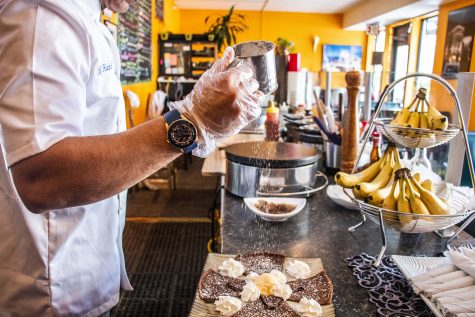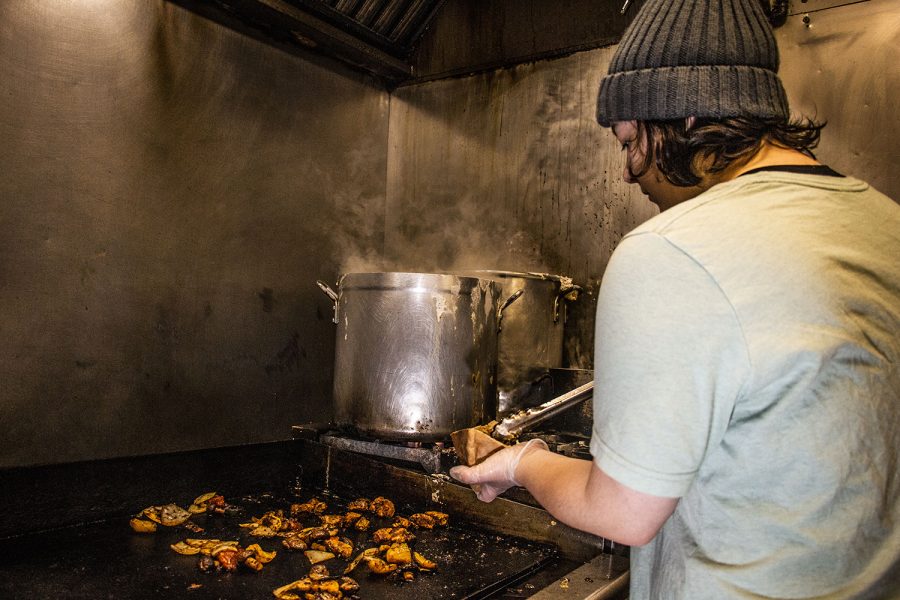Around the World in 80 Bites: Take a look inside Iowa City’s ethnic cuisine
A look at a few Iowa City eateries that bring international flair and flavors to the heart of the area.
An employee prepares food at Oasis Falafel on Thursday, Nov. 8, 2018.
November 28, 2018
Around the world, all people have a tongue that speaks their own language. It is also used to taste delicacies unique to their country, region, or city.
Similar to customs, religion, and clothing, food can speak volumes on what a culture is all about. As with artists from other countries, culinary specialists use different approaches while creating their edible work.
With many restaurants scattered throughout Johnson County, only a select few have the capability of taking their customers into another country through their menus.
According to the 2018 Culinary Forecast from Restaurant.com, ethnic cuisine is becoming more prominent at eateries. In the Downtown District alone, there are 13 restaurants with Asian origin, with specialities ranging from dumplings to pho. Mexican, Asian, Italian, Indian, and French cuisine can be found scattered throughout the city, for Iowa City residents to travel the world through their taste buds.
Besides sitting down at a restaurant, residents can find foreign commodities in small shops, such as Asia Plus, an Asian grocery store inside the Old Capitol Town Center.
Nancy Bird, the executive director of the Iowa City Downtown District, said the number of international restaurants help make Iowa City a stronger community.
“We have a lot interest in ethnic food, and we have strong market for it,” Bird said. “They’re driven by owners from all over the world.”
Oasis Falafel
Two men from Israel sat inside the Old Capitol Town Center, neither having formal experience in cooking, discussing there being no falafel store found around the area.
As a means to bring this signature Mediterranean food to Iowa City, Naftaly Stramer and Ofer Sivan, the two owners of Oasis Falafel, first set up a booth during the town’s summer festivals. After they met overwhelmingly positive feedback, the two officially moved their business into a building in 2004.
Since then, the restaurant has had a notable effect on Iowa City, with their signature hummus and falafel easily found in many grocery store aisles.
In the bottom floor, they keep several bags of dried chickpeas, which they eventually soak overnight. Once they’re ready, they cook them for a few hours inside their tight kitchen. Meanwhile, one of the staff members will chop vegetables.
Mixed together in a bowl, the chickpeas are finely chopped, sculpting the perfect falafel.
“It has a unique taste,” Stramer said. “Everything comes together in some kind of taste that blends. People love it.”
Emulating food found in fast-food shacks in Israel, the owners make sure the meals remain fresh and healthy.
“What’s important to us is the quality of the food,” Stramer said. “We start from scratch as low as we can.”
In order to appeal to an American audience, there needed to be alterations to the menu, such as their Turkish coffee. Popular throughout several Middle Eastern countries, the coffee is ground very finely and cooked in the water. Because of its strong taste, it’s typically served in a small cup.
The two started off serving the drink traditionally, but once they received complaints on its size, they began putting it in normal cups.
Sivan said people should look into having more variety in their food selections, especially if it comes from a different country.
“The more variety you have, the more rich experience you have in life,” he said. “Towns that are less diverse can benefit more from ethnic eateries. Iowa City was certainly lacking in this type of food before we opened.”
Crêpes de Luxe Café
Pouring batter into a pan, Hicham Chehouhani, the head chef of Crêpes de Luxe Café, prepares a variety of crêpes right in front of his customers.
After three minutes pass, the crêpe is removed, later adding fresh toppings, whether they’re savory or sweet. As he serves the iconic French snack to his patrons, classical French music plays in the background, giving off a Parisian vibe.
Having lived in three countries, Chehouhani cultivated his skills from various perspectives. Originally from Morocco, he began cooking at a young age, surrounded by food heavily influenced by French cuisine. Once his family moved to Nice, France, Chehouhani continued with his craft at culinary school.
After graduating, he took his skills to the seas, cooking on various cruise ships and yachts.
He eventually settled in Iowa City around 2002, wanting to open his own French-Moroccan fusion restaurant. However, because of the high price of rent, he resorted to operating a crêpe cart on the Pedestrian Mall.
He gained a following for his crêpes, but extreme weather made things difficult. So later, he moved to create a small business.
“I’m unique in all around Iowa City,” he said. “There are no other crêperies [around here.]”
Chehouhani has skills in various different types of food, but his background in France means he excels in French cuisine.

Hichan Chehouhani, owner of Crepes de Luxe Cafe, makes a raspberry Nutella crepe on Tuesday, November 27, 2018. (Katina Zentz/The Daily Iowan)
“My roots are French and Moroccan,” he said. “I can make sushi and Mexican … but it’s not going to be as pure and authentic if you don’t live in China, Japan, or Mexico.”
Chehouhani said French cuisine has a heavy emphasis on design, and the plates need to be visually interesting.
“When you plate it, you don’t plate it as you just dump it on a plate,” he said. “Everything has to separate into a beautiful decoration.”
Similarly, Chehouhani said he believes it’s important for a town to have internationally diverse restaurants, especially in a university setting.
“We have a lot of international students from everywhere in the world,” he said. “It’s very important that when they come back here, they have the taste of everything.”
Nile Ethiopian Restuarant
Hidden behind a large tank of fish, customers can be found sharing their meals, a common practice in Ethiopian culture. As the sound of a football game blares from the television, the customers tear apart their injera bread to pick up some morsel, all experiencing the rich taste.
As the owner of one of the few African restaurants in Johnson County, Kiya Sultan opened Nile Ethiopian Restaurant after spending a few months working for his uncle’s restaurant outside the state.
Sultan has been cooking for the majority of his life, but he wanted to explore his abilities in a different setting.
Prior to the restaurant’s opening, Sultan owned a hookah lounge, giving him the necessary skills to operate a business.

Similar to Chehouhani, Sultan has skills in many different cuisines, but his main draw to Ethiopian food is the specific spices often used.
“Most of them are made fresh, so it’s very healthy food,” he said.
He will often use these spices with injera bread and mantra sauce to make a dish that appeals to a universal audience.
A common misconception people have about Ethiopian food is it’s often spicy, Sultan said. However, the majority of the food on his menu is more mild. He uses spices to give the dishes more flavor rather than making them spicier.
Sultan said people are too accustomed to deeply processed fast food, and he encourages them to explore the different restaurants to explore a different type of taste.
“They don’t have anything like this in Iowa,” Sultan said.
Related: Taste of Iowa City showcases some local restaurants






















